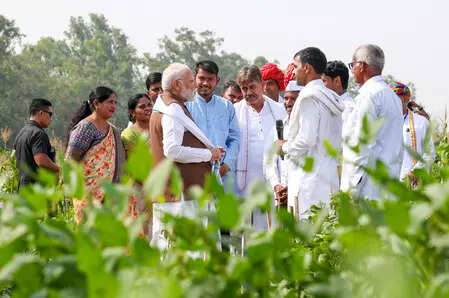
New Delhi, Prime Minister Narendra Modi on Monday highlighted the government’s commitment to enhance India’s domestic food processing capacity, underscoring its critical role in ensuring national security, rural prosperity and economic resilience.
Responding to an X post by Finance Minister Nirmala Sitharaman‘s Office, PM Modi said that it highlights “that strengthening domestic food processing capacity is a national security priority”.
“The Minister underscores how initiatives aligned with the ‘One District, One Product‘ vision are empowering farmers, generating local jobs and promoting rural self-reliance. Have a read!” PM Modi added.
The Finance Minister has underlined in her article that a revolution in agro-processing is turning farmers in the arid parts of Karnataka into entrepreneurs, converting blocks into manufacturing hubs.
“A visit to the beautiful state of Karnataka that I am privileged to represent in the Council of States – a land whose very name evokes images of lush green landscapes, waterfalls, ancient hills, verdant valleys, pristine rivers, and a history that stretches back millennia – is always invigorating. This visit was a journey through time, a study in contrasts, and a powerful reminder of our nation’s immense potential,” FM Sitharaman wrote, adding that in an increasingly protectionist global environment, strengthening our domestic food processing capacity is a national security priority.
She highlighted that for Karnataka’s aspirational districts – Yadgir and Raichur -planning must be sensitive to stark local variations. This is where the government of India’s ‘Aspirational Block Programme’ plays a crucial role, focusing not only on districts but also on sub-district and block-level disparities.
The Finance Minister said her MPLADS funds were leveraged to support farmers of the region by bringing agro-processing capabilities to their doorstep. An umbrella brand of Kalyana Sampada (Wealth of Kalyana) was created, and each district was encouraged to identify an agri-product or a set of products that could be developed into value-added commodities.
The initiative aligns with the Prime Minister’s vision of “One District, One Product” programme as an extension of ‘Make in India’ for our annadatas (farmers). In each district, a farmer producer company (FPC) was chosen by NABARD to operate the food processing and training units.
In Koppal, where per capita income is about 15 per cent below the national average, a multi-fruit processing unit has been established. Although the district cultivated about 6,000 hectares (ha) of mango, 5,000 ha of papaya, 3,000 ha of guava, and 2,000 ha of tomato, it lacked processing facilities. This is the first fruit-processing unit in the district, which now processes these fruits into products such as mango juice, dry mango powder, guava nectar, tomato puree, and ginger powder, ensuring farmers gain from value addition.
The unit can process only about 2 per cent of the fruits to juice/pulp produced in the district, and there is immense potential for many more units in this district.
In Raichur, an aspirational district known for its large pulse production – over 80,000 metric tonnes of red gram and 34,000 metric tonnes of Bengal gram annually – the new processing unit focuses on converting these pulses into arhar dal, chana dal, and a ready-to-make chilla mix. The unit can procure-process-market about 1 per cent of the total pulses produced in the district.
“At least 50 such units would be required to process about 50 per cent of all the dal produced in the district. This initiative, therefore, serves as a model for other FPOs and rural entrepreneurs in the district to emulate,” Sitharaman added.

